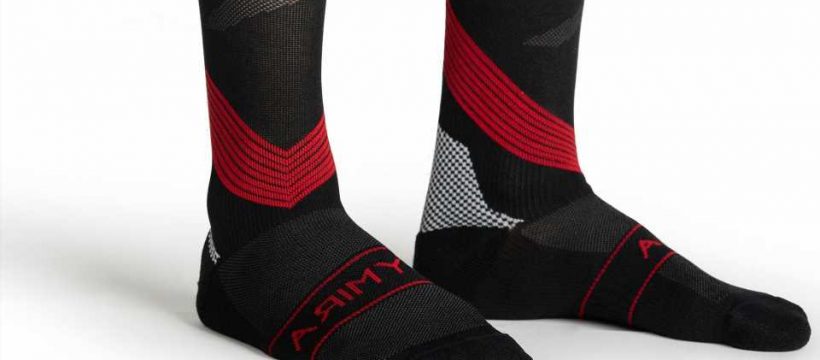FLIGHT socks are a clever way to ward off some of the negative effects of flying, simply by squeezing our legs.
The science behind the socks is quite simple – by applying gentle pressure to the muscles in our lower legs, they can increase blood flow and in turn reduce the chances of getting deep vein thrombosis (DVT) oedemas and other problems.
However, it's not a foolproof system and people can still get issues relating to blood flow during flights, even while wearing the socks.
So sportswear manufacturers Kymira claim to have further developed the technology to decrease the negative effects of plane travel on people's bodies.
By incorporating infrared technology into their flight socks, available for £35, they say that they can target problem areas, minimise the chances of life-threatening problems and even stave off the effects of jet lag.
Kymira's founder Tim Brownstone told Sun Online Travel: "It's a targeted method that increases blood flow in problem areas and has been shown to reduce pain.
Read More on Flight Safety
Flight attendant’s alphabet foot technique to stop DVT on long-haul flights
I’m a health expert – this is how I avoid jet lag and back pain during flights
"The trouble with standard compression socks is that, while they may reduce chances of oedema, for things like flights or indeed just being sedentary for a long period of time, if you're not personally activating the calf muscle, it doesn't do a huge amount.
"They're just designed to help that muscle be more effective and bring blood back up to the heart, but with Kymira socks, we use our infrared technology, which actually causes the blood vessels to open up and dilate, allowing blood to flow more freely, as well as giving them the standard compression that you would expect from a normal flight slot.
"The real big benefit is that you can get the effects of being active, like you would from rolling your ankles or going for a walk, while being completely sedentary, because the socks are causing that dilation. And that's where the big difference comes in."
By increasing blood flow with the infrared technology, the socks are also able to minimise the effects of jet lag.
Most read in News Travel

Our flight was cancelled while we were sitting on the plane ready to take off

I'm a flight attendant – here is what to do if kids are kicking your seat

The happiest holiday destination revealed – and it has beers for £2.45

Mum banned from TUI flight to Spain after making easy mistake
 4
4As well as making us feel tired, crossing time zones on longer flights can also leave us feeling stiff and absent-minded, as a result of blood not being pumped around our bodies as much as it usually is.
By increasing that blood flow, our bodies will be less likely to feel those physical effects.
Tim explained: "That increase in blood flow helps. Your calves are big pumps. Yes, they help you walk, but they're also specifically designed to help squeeze blood back up to the heart.
"And when you're sat still for a long period of time, that blood can pool, which is one reason why you get oedema.
"Keeping that blood flowing, helps to reduce some of the detrimental effects of jet lag when you're on a long flight."
While flight socks may be seen as an item aimed at certain people at higher risk of complications, Tim said more and more people are starting to use them, including younger and fitter athletes.
Some even report feeling better because of the targeted effects of the infrared technology on their legs.
He said: "If you're older, if you have low blood pressure, and indeed if you've got really high blood pressure, then that can also cause the oedema side of things.
"And likewise, there could be a multitude of medical conditions that do either put you into more of an at risk camp, or you might just be someone that does get more inflamed and more swollen.
"It may not be necessarily be medically life threatening. Our younger customers are less worried they're gonna have a DVT but still but them because, they don't want to get swollen ankles because it can be painful.
"Athletes that use our products are physically fine. They're all for the most part in their mid 20s to mid 30s and they're wearing them because it's enhancing their athletic performance, allowing them to step off a plane in a better condition than they stepped on rather than deteriorating during that flight."
Regardless of whether you're wearing flight socks, there are methods you can take to decrease your chances of medical problems and jet lag on planes.
Tim said: "In terms of just being more comfortable, the body when you're sat sedentary for such a long time will stiffen; it will inflame and there are a number of things you can do to combat that.
"Some of them are dietary. For example, you can eat or drink things that would stimulate the production of nitric oxide – something like beetroot juice, dark chocolate, leafy greens, citrus and garlic.
"That will help to reduce that sort of inflammation.
"Ultimately, you just want to make yourself as comfortable as possible without sitting in an awkward position – and stay as mobile as you can be."
Read More on The Sun
Warning to parents who drive kids to school… see if yours is on list
Woman left in hysterics as Asda provide useless substitute for pregnancy test
Wearing tight clothes on planes can increase your chances of getting DVT.
Your choice of seat can affect whether or not you feel unwell during a flight.
Source: Read Full Article







